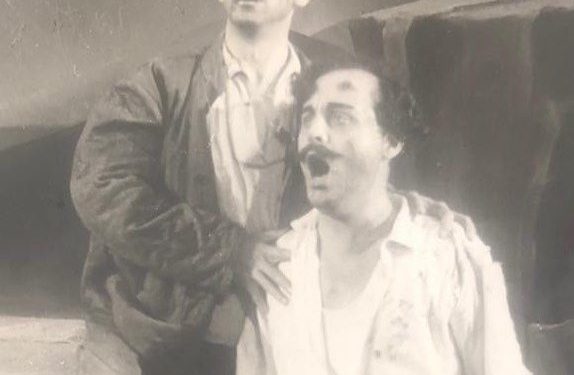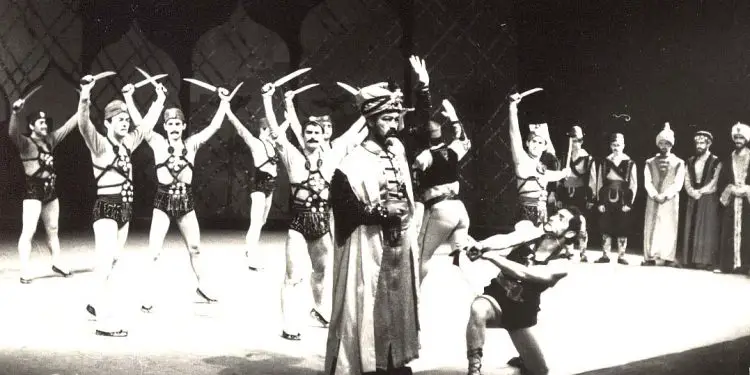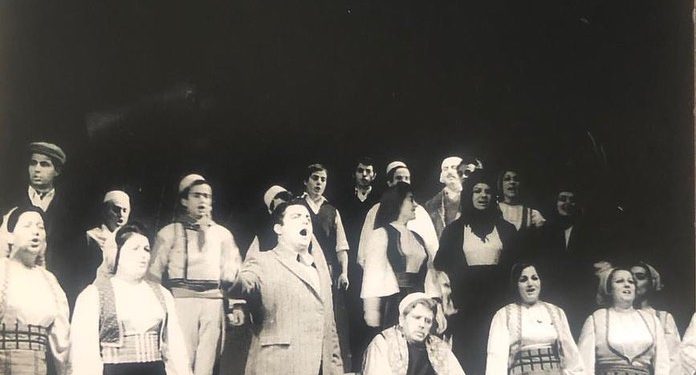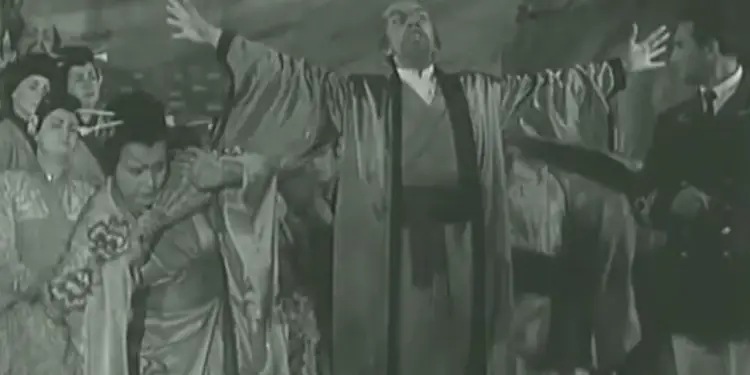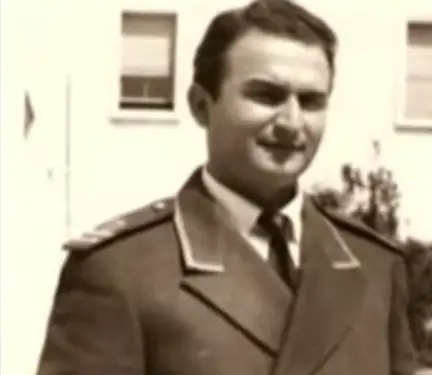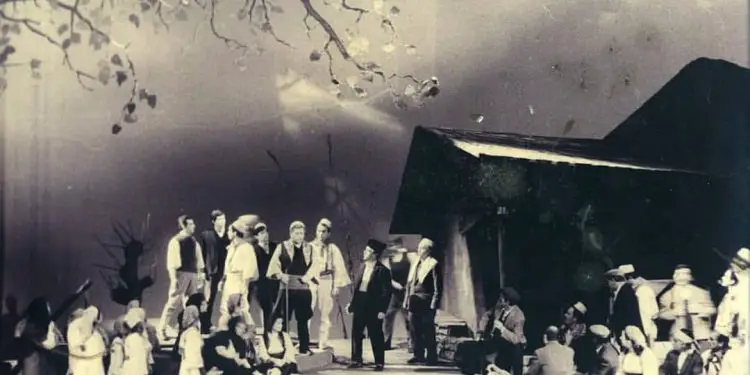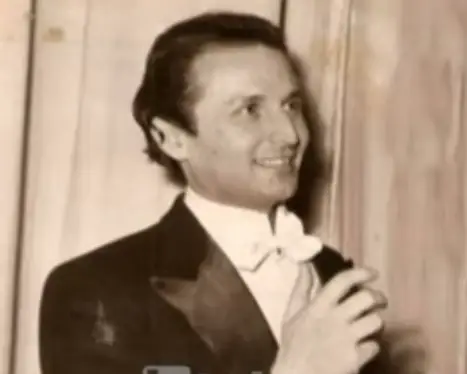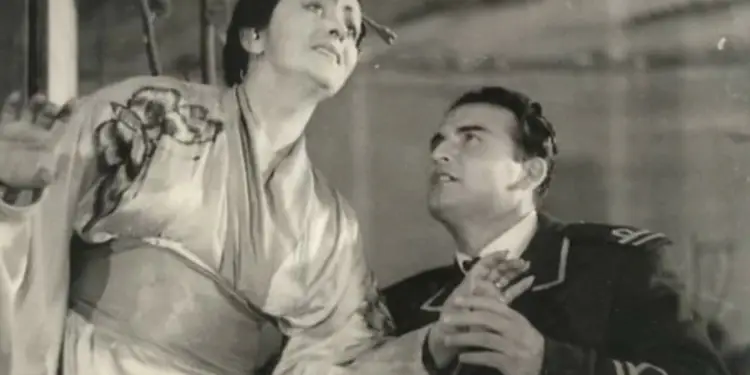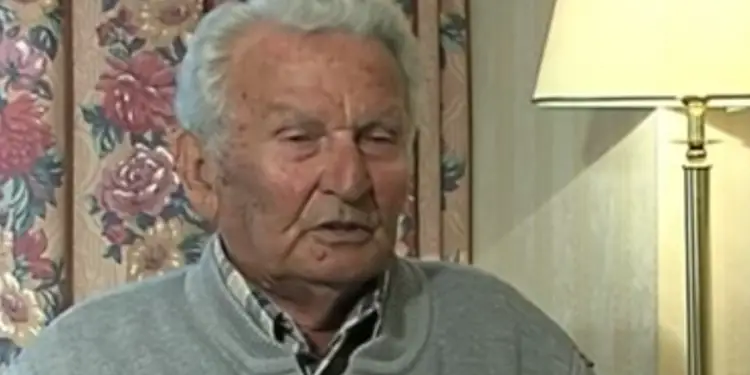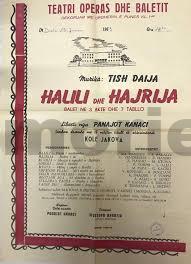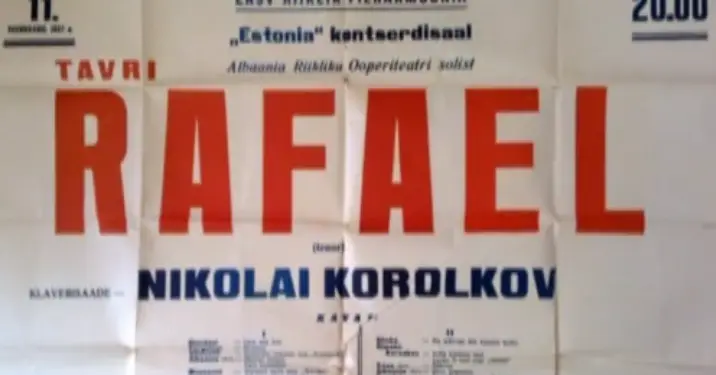Dashnor Kaloçi
Memorie.al publishes the painful story of Stavri Rafael from the city of Korça, who, after being educated at an Athens college, returned to his homeland where he fought with partisan brigades. Graduating later at the Prague Academy of Scenography and Canto, marriage to the Hungarian woman and a brilliant career as a solist and screenwriter at the Opera and Ballet Theater and the world opera scene where she won several awards. He attempted to escape from Albania in 1963 with his brother and several other friends and the long-time Calvary in the prisons of the Communist regime after shooting his brother …
It was the distant June of 1963 when the Border Battalion command in the Qafe -Thana area of the Pogradec district, by means of a special emergency radiogram, reported the Operations Office of the Interior Ministry in Tirana that its guards the unit captured four Albanian nationals near the clone who had attempted to cross the state border. Also on that urgent radiograph sent to the Ministry, it was announced that two of the offenders were Stavri Rafael, stage and soloist of the Opera and Ballet Theater, and at the same time Secretary of the Basic Organization of that institution and his brother, a military officer with the rank of captain. But who was Stavri Rafael, what was his origin, where did he study, and what were the reasons for forcing him and his brother to make their way to the border to escape Albania?
Who was Stavri Rafaeli
Stavri Rafaeli was born on September 15, 1923 in the city of Korça, where his family origin is, well known in that city for its links to the art and heritage of that city’s cultural values. From an early age, he displayed a passion for painting and singing that had been cultivated in that family for several generations. Stavri’s parents took care of the gifts that nature had given to him, so that he could do much to embrace the passion of his life. So when Stavri was no more than seven-eight years old, he was sent to take classes with one of the most famous painters of that time in the city of Korça. After finishing a unique school in his hometown, Stavri was sent to the Hellenic capital to attend the gymnasium, which he completed with excellent results in 1941. The same year, after graduating from Athens, Stavri returned. in his hometown near the family and like many other young people of that time, he became involved in the anti-fascist movement, taking part in the partisan formations of the Korça province. Stavri did not forget his passion for the song but also continued it while on the mountain, organizing partisan choirs. After the war ended, he stayed in the city of Korça where he was involved in organizing the army’s cultural and artistic activities.
Graduated in Prague for Scenography and Kanto
Seeing his talents in the field of painting and singing, in 1947 Stavri Rafael was awarded a state scholarship to pursue higher studies at the branch of Scenography at the Academy of Fine Arts in the capital of Czechoslovakia, Prague. At that Conservatory besides the scenery, Stavr followed the Kanto branch in parallel and in 1951 he graduated with excellent results in both branches. During Stavri’s studies at the Prague Conservatory, he met and fell in love with a Budapest girl named Maria, who also studied piano at the Academy’s Music branch. After receiving his degree in 1951, Stavri returned to Albania with his wife, Marien, with whom he had been crowned in Prague. Upon his return to Albania, he was immediately appointed a singer and painter at the National Theater and the State Philharmonic in Tirana. After working for two years at the institution in 1953, with the creation of the Opera and Balet Theater, Stavri was appointed soloist with the soloist section of that theater. From the beginning Stavri Rafaeli stood out as a true master of the cantos, which led him to be entrusted with many leading roles in the first opera premieres ever staged. In this regard, the head of the Archives at the Opera and Ballet Theater, Zamir Këlliçi, among other things, testifies: rich because of his extremely busy artistic activity. As Stavri emerged with a highly professional background from the beginning of his career, he was entrusted with the role of Knjaz in the first “Rusallka” opera staged by the theater. After excelling in that role, he was commissioned and participated as the first soloist in almost all the other pieces performed after Rusalka. Likewise in 1955 he participated in tours of the Opera and Ballet Theater in China, Mongolia, Korea and Vietnam. At all the concerts held in these Asian countries, Stavri excelled exclusively from all the other soloists and received constant applause during his performances. Regarding the performances given by the Albanian soloists at that time, the press of those countries where Stavri Rafael was also reserved a special place. Almost all newspapers called him “the Albanian soloist with supernatural flair”, recalled Zamir Këllici, about the beginnings of Rafael’s artistic career and the tour of Asia Minor, where he had tremendous success.
First Opera Soloist
After his highly successful debut as a soloist in the first pieces staged by the Opera and Ballet Theater, in 1956 Stavri Rafael was sent to the Soviet Union to specialize at Moscow’s famous Bolshoi Theater, which at that time it was the most popular in the whole World. For the year Stavri stayed with that theater, he participated in several plays, notably the role of the Duke, in Giuseppe Verdi’s “Rigoletto”, where he had great success. Likewise, in addition to the roles he played in “Bolshoi”, Stavri also toured various cities of the Soviet Union, such as Leningrad, Vilnius, Tbilisi, Kiev, where his performances were also well received. In 1957, after completing his specialization in Moscow, Stavri returned to Albania, and at that time he was entrusted with some of the most prominent roles of the operatic parts of the world, such as Alfred’s role in Giuseppe Verdi’s “Traviata”, Almaviva’s “The Barber”. from Rosin’s Seville, Lenski to Tchaikovsky’s “Eugene Onegin” etc. In all of these roles, Stavri had an extraordinary success, and his interpretation was regarded as equal to that of many of his colleagues who then performed in various scenes in the world. After these performances, he also participated in a tour of Hungary where the role of Duke in “Rigoletto”, was very successful and the Hungarian public gave him continuous applause with long ovations. After this performance, he also participated in several other concerts, where he performed different arias from the most chosen repertoire of parts of world opera.
Award in Vienna and success in Europe
Stavri Rafaeli’s brilliant artistic career was followed by his participation in the VII Student Youth Festival that took place in Vienna, Austria in 1959. Concerning this artistic activity of world scope, the Albanian soloist Rafaeli had a extraordinary success, TOB Archive Officer Zamir Këllici testifies: “Stavri Rafael’s participation in that student youth festival marked one of the highlights of his artistic life because of his brilliant vocalist interpretation, was awarded the second prize. After the great success he achieved in Vienna, Stavri Rafael also took part in another tour in Italy, where he performed with great success different arias from the most popular parts of world opera. After Italy he took another tour of Czechoslovakia, where he had graduated and had spent some of the most beautiful years of his youth. In this tour which featured performances in the cities of Prague, Bratislava, Koshica, etc., Stavri successfully performed the roles of Duke in Verdi’s “Traviata” and Alfred’s in “Rigoletto”. Also during that tour, Stavri also prepared scenery and costumes of some of the pieces performed by Albanian TOB artists. Upon returning to Albania in 1961 he participated as a soloist in some of the masterpieces of world opera, such as Pinkerton in Giacomo Puccini’s “Madam Butterfly” and Don Jose in the opera “Carmen” by George Bizet. The role of Don Hosea which he performed in 1961 marked the end of his short but brilliant career ”, testifies Zamir Këlliçi, regarding the former great Albanian vocal master, Stavri Rafaeli.
Attempted escape, 15 years in prison
Although Stavri had a brilliant career during those 13 years of performing on the Albanian and world stage, he was not satisfied at all with the life he made and the treatment generally given to artists in Albania. Although he held the position of secretary of the Party’s Basic Organization at the Opera and Ballet Theater, he was by no means a fanatic communist. On the contrary, his former colleagues remember him as a very liberal and over-the-top man of all sorts. Stavri had first toured many different places in the World and he had a different understanding of life. This fact made him disagree with the politics of the communist regime in Albania, though he had been drawn to run one of the communist art cells. The great dissatisfaction and his anger with the Communist regime in power began, especially after the breakup of Albania with the Soviet Union and other Eastern European countries that constituted the Socialist Camp. At that time many Albanian intellectuals who had studied in Eastern countries and married foreign girls, the Communist regime pressured them to separate. Even Stavri Rafael had different pressures to separate from his Hungarian wife Maria, with whom he had been living since 1951 when they were students in Prague. Stavri refused to be separated from his hygienic wife, and at that time he found support for his brother, who was a captain in the military. During that conversation, Stavr informed his brother about the extremely difficult situation he was in, which did not preclude him from being arrested. After that, the two brothers decided to flee Albania. Their intention was that after the escape, the Albanian state would also allow Stavr’s wife, Marien, to leave Albania for her homeland in Hungary. But their desire could not be realized, because in June 1963, as Stavri and his brother and two friends attempted to cross the state border in the Bilisht area, they were captured by border guards near the clone, when only a few steps separated them from the freedom they had dreamed of. Thereafter, they were both brought on trial in Tirana with open doors, accused of agitation and propaganda and high treason against the homeland. Finally, the prosecutor demanded that Stavri be sentenced to 15 years in prison, and for his military brother, the death sentence, which was also upheld by the trial panel. While his brother-in-law was shot dead, Stavri was sent to serve his sentence as an enemy of the people in forced labor camps. His Hungarian wife, Marien, was interned in the city of Fier.
After prison with Mari in Hungary
The great master of the Albanian opera scene, Stavri Rafaeli, served his entire sentence as a political prisoner in some camps and prisons, and was released only in 1978. On the day he was released, Stavrin received his wife Maria at the prison door, who, after his conviction, not only did not divorce her, but instead pursued her Albanian husband in all camps and prisons, and maintained regular correspondence with her by letters. For nearly 27 years, Maria worked as a music teacher at one of the Fier schools, under the constant psychological pressure of the State Security that often reminded her husband of being an enemy of the people. It was not until the 1990s that Stavri Rafael’s dream came true. He and his wife, Marien, fled Albania and settled in a small town by the lake Balaton, Hungary, where they still live. For her great contribution to the city of Fier as a music teacher, on March 7, 2001, the Fier City Council awarded her the title of “Honorary Citizen”. Maria came and took this title by herself, in respect of the city where she had spent most of her life and the common people had respected her, though her husband was in prison as an “enemy of the people.”/Memorie.al




